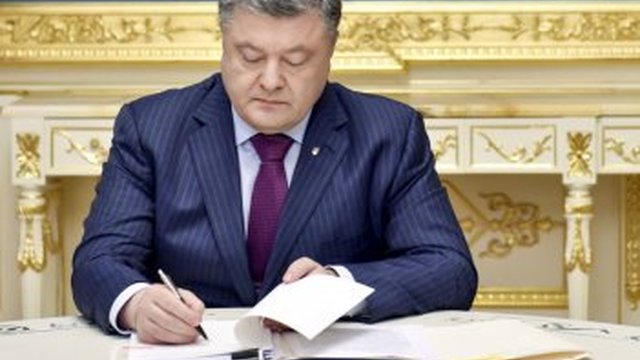Poroshenko signs law on High Council of Justice

Ukrainian President Petro Poroshenko has singed the law on the High Council of Justice, according to the parliament's website.
"The law signed by the president returned [to parliament] on January 3, 2017," says the Rada's website.
As reported on Tuesday by the president's press service, Poroshenko signed the law during a meeting with Chairman of the High Council of Justice Ihor Benedysiuk and Presidential Administration Deputy Head Oleksiy Filatov.
"The body, which will remove the political element from the judicial system, will assume the function of appointing judges from the Verkhovna Rada. It [the High Council of Justice] will be responsible for disciplining and dismissing judges," Poroshenko was quoted as saying.
The president said the law, titled "On the High Council of Justice," received positive reviews from the European Union's Venice Commission and partners from the U.S. and the EU.
"I think the bill provides Ukrainian citizens with key rights – to justice and a fair trial," Poroshenko said.
The head of state thanked the Rada for supporting the law and adopting it in a timely fashion, allowing the High Council of Justice to begin work already in 2017.
In addition, Poroshenko signed the law on introducing changes to Ukraine's Budget Code, which, regulate the issue of financing the High Council of Justice.
Lawmakers on December 21, 2016 passed the law on the High Council of Justice.
The bill sets the status, power, the basis of organization and operation of the High Council of Justice. The council is an independent constitutional body of judicial self-government permanently operating to ensure independence of judicial power. Its functioning is based on responsibility to society.
According to the document, the High Council of Justice will make decisions to dismiss judges from their posts and permit detention or arrest of judges. At present, Ukrainian parliament gives consent to detain or arrest judges.
The council would have powers to submit proposals to appoint judges, create bodies to hear cases on disciplinary responsibility of judges, make decisions to transfer judges from one court to another, agree the number of judges in court, participate in determining expenses of the national budget for maintaining courts and justice agencies, approve the requirements for staff, financial and material provision of courts under a proposal of the State Court Administration of Ukraine.
The High Council of Justice consists of 21 members. Some 10 members are elected by the congress of judges, the president appoints two of them, parliament two more, the congress of lawyers two more, the Ukrainian conference of prosecutors two more and the congress of representatives of law educational and scientific institutions two more.
The chairman of the Supreme Court is a member of the council by virtue of his position.
Council members' tenure is four years. The same person cannot be a member of the High Council of Justice two tenures in a row. The law provides the procedure for electing members of the council, their rights and the procedure for dismissal.
A member of the council must be a Ukrainian citizen not younger than 35 years with a higher legal education and professional work record in the field not less than 15 years. He or she must be politically neutral. Members of political parties, or individuals who work for political parties or for other organizations with political goals or that takes part in political activities cannot become council members. Elected government officials are also ineligible, as are individuals who take part in the organization or funding of political campaigns and other activities.
Members of the High Council of Justice, apart from the Chairman of the Supreme Court, fulfill their permanent mandates.
The structure and activity arrangement for the High Council of Justice is described in the document. The council creates disciplinary panels consisting primarily of former judges and at least four council members, to hear disciplinary cases.










